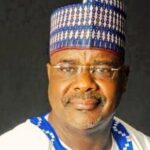The Zambian government has indicated interest in understudying the operation of the National Values charter, the cornerstone of the proposed Nigerian Identity Project which was earlier approved by the Federal Executive Council (FEC).
This was the resolution reached at the second bi-lateral talks between officials of the National Orientation Agency (NOA), led by its Director General, Mallam Lanre Issa-Onilu and the Zambian High Commission officials in Nigeria led by Jenipher Mutembo, Deputy High Commissioner at the headquarters of the Agency in Abuja.
While addressing the team from the Zambian High Commission, the NOA boss, Mallam Lanre Issa-Onilu, gave an overview of the operational structure of the agency saying, it is is one of the largest in Nigeria, with 818 offices across all 774 local government areas, 36 states, and the Federal Capital Territory.
Issa-Onilu explained that the NOA is deeply rooted at the grassroots level and remain a vital communication channel between the government and the people.
He further said that the Agency communicates government policies, programmes, and projects to citizens and collates grassroots feedback to inform decision-making.
According to him; “The feedback is regularly submitted to the relevant government institutions and the parliament”.
The NOA DG also said that the Agency promotes patriotism, civic responsibility, and unity among Nigerians.
Issa-Onilu shared his experience at a recent programme in the United Kingdom, where he met the Gambian High Commissioner in London, who took interest in the work of the NOA, indicating potentials for broader African collaboration.

Issa-Onilu expressed optimism that Zambia might similarly engage in such partnerships even as he noted the what he described as the narrow perception of leadership in Africa that is typically limited to political figures, instead of encompassing civil, traditional, and moral leaders as influencers of national values.
Speaking in turn, the Zambian Deputy High Commissioner, Mrs Jenipher Mutembo applauded the institutional strength and nationwide structure of the NOA.
Mutembo said; “I must commend your presence in all local government areas. This grassroots model is powerful, and we see its potential as a framework for other African countries, Zambia included, can learn from”.
Mutembo also commended the NOA’s commitment in providing an opportunity for Zambia to observe, learn, and possibly adopt aspects of its operational methodology for national reorientation and civic education.
She noted the shared African values, youth influence, and the role of media, particularly touching on cultural perceptions exported through Nigeria’s creative industry.
In the words of Mutembo; “Our young people are watching these films. They are learning, forming ideas, and creating perceptions, sometimes misinformed, about success, morality, and identity.
“What we portray shapes national values and international image. As leaders, we have a duty to ensure that the content reaching the public inspires unity, innovation, dignity, and pride in African heritage.
“Nigeria is the cultural giant of Africa, and Nollywood is one of your most powerful exports. However, as a sister country, I must mention, with respect, that there is growing concern in Zambia, particularly among our youth, about the dominant themes of rituals, occultism, and superstitions in many Nollywood productions,” she said.
While raising the importance of inter-agency collaboration and South-South knowledge exchange, Mutembo proposed a more formal mechanism for technical cooperation between Zambia and Nigeria on civic education and grassroots mobilisation, cultural diplomacy and media content exchange.
She further reaffirmed Zambia’s commitment to strengthening bilateral relations and expressed appreciation for NOA’s strategic leadership, adding that Zambia is actively seeking models that foster behavioural change and civic responsibility to support sustainable development.
Mutembo acknowledged that Nigeria’s investment in structured national orientation can serve as a reference for Zambia’s own national development strategy, particularly in promoting public participation in governance and responsible citizenship.
A statement by Paul Odenyi, Deputy Director in the communication and Media Department of NOA, stated that Mutembo expressed gratitude for the hospitality and openness extended to her and her team by Mallam Issa-Onilu and his team.










